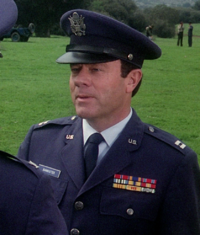Jack Ging
| |||||

| |||||
| {{{credit}}} | |||||
| Portrays: | Captain Bannister | ||||
| Date of Birth: | October 30, 1931 | ||||
| Date of Death: | Missing required parameter 1=month! , | ||||
| Age: | 92 | ||||
| Nationality: | |||||
| Related Media | |||||
|---|---|---|---|---|---|
| @ BW Media | |||||
[ Official Site]
| |||||
Jack Ging (born October 30, 1931) portrayed Captain Bannister in the Galactica 1980 episode "The Super Scouts, Part I".
Ging enjoyed a rather fruitful career as a television actor from the late 1950s to the early 1990s before retiring in California with his wife "Apache" in 1994. During that time, he worked in over 100 productions, mostly for television, including many of the western genre television shows produced in the 1960s. His success as a supporting character transfered to the big screen and he became a minor player in the boom of Hollywood westerns in the late 1960s and early 1970s, usually in supporting roles opposite Clint Eastwood.
Ging also starred in a small handful of minor independent and exploitation films in the 1960s and early 1970s, such as Intimacy, Die, Sister Die! and Sniper's Ridge. In 1973, he co-starred opposite Battlestar Galactica alumnus Dirk Benedict in the hippie exploitation film SSSSSSS.
Ging's career on television would become what he was most remembered for, especially in his portrayal of the role of General "Bull" Fullbright on The A-Team. Ging's character held the distinction of being the only principle character on The A-Team to be killed (on a mission to Vietnam to save his daughter)[1]. In addition to the The A-Team and Galactica 1980 Ging acted in supporting roles in three different episodes of Perry Mason (as three different characters) and in other cult shows on the era such as The Mod Squad, Alfred Hitchcock Presents, Hawaii Five-O, Gunsmoke, Bonanza, The Six Million Dollar Man and The Bionic Woman.
References
- ↑ Jack Ging biography on IMDb (backup available on Archive.org) (in English). This information comes from a biography written on IMDb. The information in the biography is uncited, and therefore should be treated with skepticism.